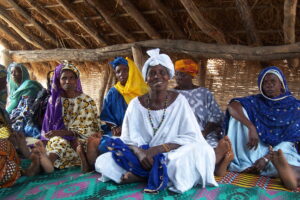Lunch seminars are informal presentations where internal and visiting researchers present their work during lunch. You are welcome to bring your lunch along! We offer tea and coffee to go with it. The seminars are hybrid and take place on campus and online. Please register by sending an email to haiyan.huang@ugent.be
The seminars are open to all, PhD students, postdocs, senior researchers, and other interested individuals.
 About the lunch seminar
About the lunch seminar
Grandmother-exclusionary bias” – or the side-lining of female elders as change agents within programmes – represents a major obstacle to the success of programmes that aim to end Female Genital Cutting (FGC). Grandmother-exclusionary bias runs counter to the extensive authority and decision-making roles that grandmothers wield in relation to FGC and child marriage in sub-Saharan Africa. It also goes against insights from systems theory and meta-evaluations of FGM/C eradication efforts which stress that sustained change requires engaging those who wield authority over gender and social norms. I use postcolonial and decolonial theory to explain the negative assumptions about grandmothers which underpin grandmother-exclusionary bias, and provide recommendations for designing grandmother-inclusive, intergenerational community-led programmes.
About the speaker
Dr Anneke Newman works as a postdoctoral fellow at the Department of Conflict and Development Studies at Ghent University. Before that she worked as a Teaching Fellow at Sussex and a FNRS-funded postdoctoral researcher at the Laboratoire d’Anthropologie des Mondes Contemporains (LAMC) at the Université Libre de Bruxelles (ULB). Newman’s current research is a decolonial analysis of knowledge production and policy-making related to Female Genital Mutilation/Cutting (FGM/C) and child marriage. Her previous projects investigated educational decision-making involving secular and Islamic schools, and the education-migration-development nexus, in northern Senegal. Her research focuses on the coloniality of development policy, decolonial alternatives, action research and participatory approaches.
(picture credit Judi Aubel, Grandmothers of Vélingara)